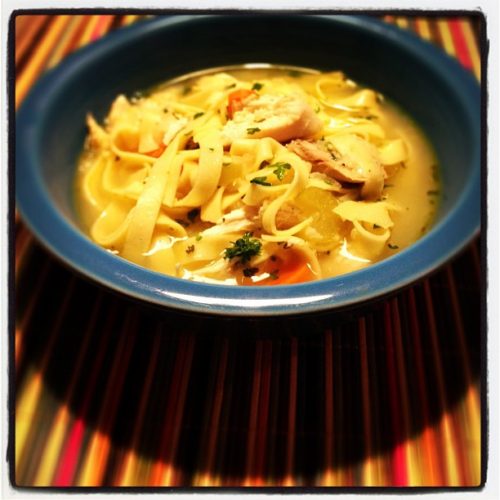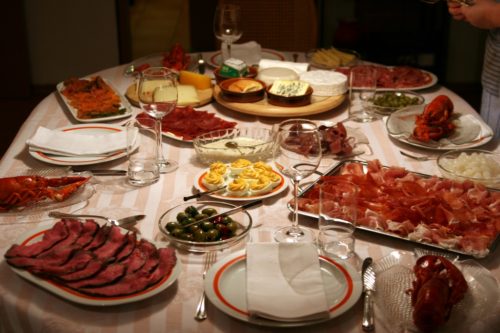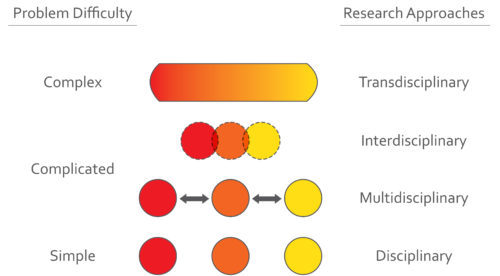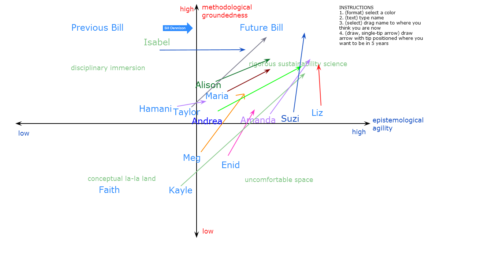Chicken Noodle Soup: A Transdisciplinary Recipe for Sustainability Science
Enid C. Muñoz Ruiz · 11 commentsIngredients:
2-1/2 pounds bone-in chicken thighs
1-1/4 teaspoons pepper, divided
1/2 teaspoon salt (or Adobo)
1 tablespoon canola oil
1 large onion, chopped
1 garlic clove, minced
10 cups chicken broth
4 celery ribs, chopped
4 medium carrots, chopped
2 bay leaves
1/4 teaspoon dried thyme
3 cups egg noodles (about 8 ounces)
1 tablespoon chopped fresh parsley
1 tablespoon lemon juice

With winter approaching fast, there is nothing better to keep you satiated and warm than a delicious bowl of chicken noodle soup. This marvelous recipe by Tastes of Home is a low-calorie (239 per serving) fusion of healthy fats, carbohydrates, and protein in one tasty dish. Click here for directions on how to prepare this soup.

Let’s pretend each nutritional category is a discipline. If you have a dinner party and serve separate dishes of carbohydrates, healthy fats, and protein, you have a disciplinary approach where all the foods have their own purpose: to provide sustenance. For a multidisciplinary approach, you have a dish containing carbohydrates on one side and protein on the other. Just like with our individual disciplines, they are also goal-oriented, but will have boundaries that generally do not touch. Suppose we have another dish on our big party table with fats and carbohydrates, such as chips and guacamole. These disciplines will be side-by-side, integrating their delicious properties as they intertwine with each other through each dip. Thus, we have an interdisciplinary approach. It is similar to multidisciplinary, but the difference is that interdisciplinary has the disciplines blend into each other like dipping a nacho chip in guacamole. Lastly, in a dish like our delicious chicken noodle soup, we integrate all disciplines to form a magnificent meal. The end product is a transdisciplinary approach in which all the disciplines collaborate to form a real-world solution: satiate your hunger. Notice how the complexity of mixed-disciplinary approaches increases as we move towards a transdisciplinary soup.
At the beginning of the class discussion, we had some trouble understanding the difference between transdisciplinary and undisciplinary. Amanda suggested that the main divider seems to be working with communities. What really sets apart all of these mixed-disciplinary approaches from transdisciplinary is this approach is problem-specificity towards societal issues.1 Suzi mentioned that they are both similar in terms of objective and methodology, but transdisciplinary requires plurality of scientists from multiple backgrounds and undisciplinary, in contrast, is at the level of an individual with interdisciplinary experience.

According to Dr. Bill Dennison, who lectured this week, the seven principles to transdisciplinary research are:2
- Transdisciplinary is directed toward intricate problems requiring intricate solutions.
- Instead of deriving general theorems from different backgrounds, transdisciplinary centers on a place-based focus and from there, it derives perspectives and solutions.
- Intricate solutions are time consuming, thus transdisciplinary is time-intensive.
- Transdisciplinary relates more to academia than to stakeholders or decision-makers.
- Thorough leadership skills are involved in transdisciplinary.
- Transdisciplinary requires intense collaboration and networking.
- Transdisciplinary epistemologically merges knowledge from different disciplines.
To read more in depth on each principle click here.
This week's reading by Jahn et al. focused on finding the common ground in past transdisciplinary literature to obtain a proper definition and framework. Then from this framework, they built a conceptual model explaining the feasibility of the transdisciplinary research process. Their model states that transdisciplinarity begins with the formation of a common research object, from which knowledge will be produced by effectively combining science and society.3
Global climate issues have increased the urge for a field of study whose sole purpose centers on one goal: sustainability. The problem is that sustainability as a science discipline itself is under debate, because its current theory, practice, and discipline stems from interdisciplinary collaborations. Lang et al. collected design theories for sustainability science from a transdisciplinary approach.4 The Belmont forum is an international partnership aiming towards transdisciplinary and transnational methods to remove barriers in sustainability science. This partnership is comprised of councils and members from all over the world who fund research directed towards attacking global environmental change.5
The paper by Haider et al. describes the undisciplinary journey of graduate students involved with sustainability science. The authors conducted surveys, forum theater, and panel discussions with graduate students to obtain a better understanding of where students are currently standing. They found that sustainability research scientists face early challenges because of lack of formalized institutional training and support in transdisciplinary education, thus leaving them in uncomfortable spots or la-la land when fleeing from disciplinary immersion when it comes to research.

We performed a similar exercise in class in which a plot showing the relationship between “epistemological agility” vs. “methodological groundedness” was set upon the computer. Everyone had to place their name where they feel they are now in their career and point to where they want to head towards. The majority of the class feels they are carrying out a “rigorous sustainable science” approach with expectations of moving farther up this quadrant. Students like Kayle, Meg, and Faith believe that they are in a “conceptual la-la land,” with Faith feeling that she will stay there. I’m the only one in an “uncomfortable space” with hopes of moving up to “rigorous sustainable science”. Looking back on this plot, I should’ve placed my name lower, because it is very hard to go for transdisciplinary research when the system seems so divided between academia and real-life applications.
What about you? Where do you think you
fall in this plot? Are you in “conceptual la-la land” or “uncomfortable space”?
Do you feel your research is transdisciplinary? Interdisciplinary?
Undisciplinary? Enjoy a nice bowl of chicken noodle soup while you think about
these questions.
References:
1. Haider, L. J., Hentati-Sundberg, J., Giusti, M., Goodness, J., Hamann, M., Masterson, V. A., … Sinare, H. (2018). The undisciplinary journey: early-career perspectives in sustainability science. Sustainability science, 13(1), 191–204. doi:10.1007/s11625-017-0445-1.
2. Dennison, B. (2017). Retrieved from /blog/transdisciplinary-literacy-seven-principles-that-help-define-transdisciplinary-research/.
3. Jahn, T., Bergmann, M., & Keil, F. (2012). Transdisciplinarity: Between mainstreaming and marginalization. Ecological Economics, 79, 1–10. doi: 10.1016/j.ecolecon.2012.04.017.
4. Lang, D.J., Wiek, A., Bergmann, M. et al. (2012). Transdisciplinary research in sustainability science: practice, principles, and challenges. Sustain Science, 7(Suppl 1): 25. https://doi.org/10.1007/s11625-011-0149-x.
5. Belmont Forum. Retrieved from http://www.belmontforum.org/.
Next Post > Making connections to ensure a clean and healthy Chesapeake Bay
Comments
-
Mars 6 years ago
Not wanting to sound negative, we should be making an effort to consume more organic meat, like chicken, because the rate of meat consumption is not sustainable: https://myhomefarm.co.uk/sustainability-of-eating-meat
Chicken noodle soup, a personal favorite of mine, is supposed to be healthy and nourishing... eating chickens reared in a month that are pumped full of antibiotics doesn’t work for me. Just my two cents worth.
-
Taylor Gedeon 6 years ago
It really is so interesting how we all see ourselves in such different areas of the undisciplinary realm, yet we all chose the same foundation in the same graduate program (advertised as interdisciplinary). Does this mean our foundation can be approached from a wide variety of approaches (conceptual to methodological)?
-
Isabel Sullivan 6 years ago
I love that you used chicken soup to explain the concept of transdisciplinary! It was a great explanation and I enjoyed your explanations of where you were on the undiscipilinary plot. Nice!
-
Faith Taylor 6 years ago
I LOVE how you related the different types of disciplinary approaches to food. If I make an oatmeal raisin cookie which approach would that be? haha
-
HAMANI WILSON 6 years ago
Very Well done, nice and creative. "Intricate solutions are time consuming, thus transdisciplinary is time-intensive." very important distinction.
-
Michael 6 years ago
Great blog. Very well written. Loved the chicken soup metaphor. This helped a lot since I missed class.
-
Kayle Krieg 6 years ago
Thank you for the chicken noodle soup recipe. I will enjoy eating it on these cold MD days, as I contemplate transdisciplinary research. Looking back at the class exercise, I wonder if I put myself in the correct starting quadrant. It is a really interesting thought exercise, and I will be interested to see how I will place myself at the end of this PhD journey.
-
Andrea Maria Miralles-Barboza 6 years ago
Looking back at the graph I feel I placed myself in the wrong place as well, but that just means room to grow! great blog
-
Megan Munkacsy 6 years ago
You did a great job summarizing Bill's talk. I was also confused about the differences between terms and you helped an audience outside of our class understand those differences. Nice job!
-
Amanda Rockler 6 years ago
I hate cooking, but I really enjoyed the blog! I hope to continue to move to the NE corner of the of the plot and I have always been disciplined so the idea of calling myself an undisciplined practitioner makes me feel like a rebel!
-
Alison Thieme 6 years ago
Good blog, I’m hungry for more! I wonder what the limit is for the size and complexity of a problem to become worthy of a Transdisciplinary approach